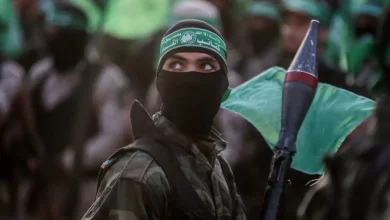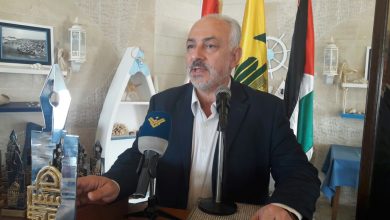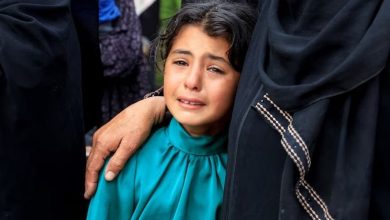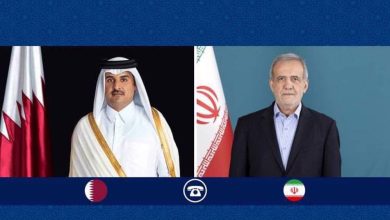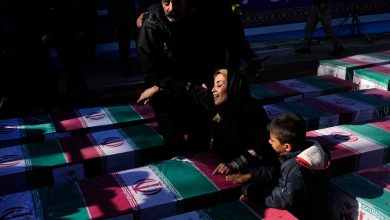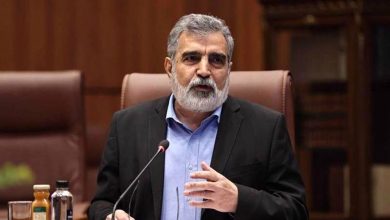Diplomat of Defiance: Martyr Amir-Abdollahian Emerges as Global Advocate for Palestine
In a recent ceremony honoring the "martyrs of service" held in Tehran, Iranian President Masoud Pezeshkian shared a touching narrative involving Oman's foreign minister. The minister was profoundly impacted by the modest nature of the home belonging to Iran's deceased chief diplomat, Hossein Amir-Abdollahian. This reflection served as a powerful symbol of Amir-Abdollahian's life characterized by humility and dedication.

During a visit to the home of the late Foreign Minister Amir-Abdollahian, an Omani official expressed surprise at the modesty of the residence, noting it was far less extravagant than his own lavish abode, according to remarks by President Pezeshkian.
Iran’s Foreign Minister, aged 50, perished in a tragic helicopter crash on May 19, 2024, alongside President Ebrahim Raeisi and additional individuals. The incident occurred under foggy conditions in northwestern Iran.
Amir-Abdollahian gained recognition for his humble way of living and, more significantly, for ardently advocating for the rights of oppressed populations on the international platform.
He adeptly utilized his diplomatic role to emerge as a “spokesperson,” “commander,” and “ambassador” for the Axis of Resistance, capitalizing on his in-depth knowledge of Arab Muslim nations in the region.
He asserted that the Palestinian people and resistance groups possess the right to self-determination and are justified in resisting the oppressive forces of occupation and subjugation.
Regional and international stakeholders should avoid enforcing externally crafted strategies on the Palestinian people, it was stated during a meeting with leaders of Palestinian resistance groups in Beirut in February 2024. The emphasis was placed on empowering Palestinians to determine their own future through frameworks that are consensually established among themselves.
With the commencement of Operation Al-Aqsa Flood on October 7, 2023, Amir-Abdollahian emerged as one of the initial international political figures to advocate for and defend the legitimate rights of the Palestinian people to resist the regime in Tel Aviv and its supporters.
During the intense bombardment of Gaza, which commenced in the wake of Operation Al-Aqsa Flood alongside a severe humanitarian blockade, Trump opted to be notably vocal and outspoken.
In defiance of global pressure, he asserted that the initiation of violence lay with the Zionist regime, labeling resistance as a legitimate and natural reaction.
**Envoy of Defiance**
At the age of 33, Hossein Amir-Abdollahian was appointed as Iran’s deputy ambassador in Baghdad. Following a four-year tenure in this position, he assumed the role of director of the Persian Gulf desk at the Iranian Foreign Ministry in 2001.
In 2003, amid the US invasion of Iraq, Amir-Abdollahian took on the role of deputy to the special aide for Iraq within the foreign ministry.
Sources close to the individual reveal his profound understanding of the prevailing political dynamics in the Arab world, a factor that has facilitated his strong association with Lebanon’s Hezbollah resistance movement.
His close ties with Hezbollah were also rooted in a deep and enduring friendship with General Qassem Soleimani, a leading figure in Iran’s anti-terror efforts.
With over two decades of experience in the foreign ministry, specifically in significant roles concerning Arab and African matters, he forged a strong working relationship with the late Iranian commander who courageously spearheaded the battle against Daesh and its Western supporters.
Upon assuming command of the Quds Force of the Islamic Revolution Guards Corps (IRGC), General Soleimani aligned with Amir-Abdollahian, who was then an Iraq specialist at the foreign ministry. Their mutual evaluations positioned them within the same strategic and intellectual sphere, resulting in coordinated efforts and collaborative actions that served the interests of Iran and the broader region.
In the aftermath of the 2003 developments in Iraq and the subsequent fall of Iraqi leader Saddam Hussein, Amir-Abdollahian was designated as the lead for the Iraq portfolio at the foreign ministry.
His proficiency in Arabic and extensive understanding of the political dynamics in the Arab states of the Persian Gulf elevated his status as a significant figure, compelling General Soleimani to engage with him directly on issues concerning the nations aligned with the resistance axis.
Amir-Abdollahian has enhanced coordination with regional resistance factions, including Hamas and Islamic Jihad, following the pivotal Operation Al-Aqsa Flood on October 7.
He frequently traveled, maintained constant communication, and hosted Palestinian resistance groups, amplifying their voices on a global stage.
The meetings conducted by Amir-Abdollahian with Hezbollah in Lebanon after October 7 signified his stature as a trusted diplomatic conduit between Iran and Lebanon.
In the wake of the escalating conflict and violence in Gaza, efforts were intensified to direct Iran’s diplomatic endeavors with Arab nations towards attaining a ceasefire between Israel and Hamas.
Enhancing the capabilities of the “frontline states” aligned with the Axis of Resistance, particularly in reaction to the developments of the October 7 operation, emerged as a significant focus within his diplomatic agenda during that period.
He exerted a significant influence on the global stage, ensuring the Palestinian people’s voice was heard at international summits. With unwavering dedication, he supported initiatives to halt the ongoing genocide and advocated for the removal of the oppressive and unfair blockade.
In April 2024, merely a month before his martyrdom, Amir-Abdollahian utilized a United Nations Security Council session to deliver a strong condemnation of the Israeli government, accusing it of committing genocidal war crimes in Gaza.
He highlighted Israel’s continued defiance of established red lines and its pursuit of policies accused of apartheid, ethnic cleansing, and genocide against Palestinians, with backing from the US and other allies.
A statement was made asserting that Israel should not be regarded as a legitimate state but rather as an occupying power. The speaker emphasized that, based on established international law principles, the occupation of any territory is deemed temporary, regardless of its duration, and thus cannot eventually gain legitimacy over time.
He emphasized the idea of eradicating Palestinian resistance and Hamas, viewed as a liberation movement opposing the occupying power, as merely an “illusion.”
**The Voice of Dissent**
In a recent interview, Abolfazl Amouei, spokesperson for the National Security and Foreign Policy Commission of Iran’s parliament, referred to the late Amir-Abdollahian as a “resistance diplomat” following his reported martyrdom.
Amouei stated that his extensive expertise and dedication to regional nations, particularly in the Persian Gulf during his tenure with the Iraq Task Force at the foreign ministry, and later in the Levant, notably in Lebanon and Syria, along with his ties to the resistance front, have established him as a prominent voice for the resistance movement and a proponent of Islamic unity.
In addition to his international parliamentary responsibilities, Amir-Abdollahian held the position of secretary for the Conference in Support of the Palestinian Intifada.
In his role, he fostered strong connections with resistance groups in the region. According to Amouei, his engagements with Hezbollah in Lebanon, Palestinian resistance factions such as Hamas and Islamic Jihad, as well as Iraqi resistance organizations, were grounded in mutual understanding and shared insights, making these interactions evident.
Amouei noted that during his tenure as foreign minister, Amir-Abdollahian aimed to forge strong connections with key pillars of the Islamic Republic’s authority, notably the defense and military sectors.
The recent months have witnessed a substantial boost in diplomatic efforts backing the resistance, reaching their zenith during the Al-Aqsa Flood events. During this period, Amir-Abdollahian emerged prominently as the primary advocate for the resistance on the international diplomatic stage.
Amouei has stated that resistance groups continue their activities despite his martyrdom. However, he criticized the existing international framework and global institutions for lacking an adequate platform to support these groups.
The foreign minister emerged as a distinct voice in influential platforms like the United Nations Security Council and the UN Human Rights Council. His remarks in these forums encapsulated the plight faced by the Palestinian people and resonated with the aspirations for resistance and rejuvenation among the populations of Lebanon, Yemen, Iraq, and Syria.
Amouei emphasized that Amir-Abdollahian’s close collaboration with Martyr General Soleimani, as well as his rapport with other notable resistance leaders, significantly contributed to his emergence as an “outstanding, irreplaceable figure” in the sphere of resistance diplomacy.
The responses observed from various countries in the region concerning his martyrdom appear to partially reflect the esteem for his personal involvement and dedication to advocating for the rights of the Palestinian people during the Al-Aqsa Flood operation.
**Leader of Resistance Diplomacy**
During the international conference on “Resistance Diplomacy and Commemoration of the Martyrs of Service” on Sunday, Adnan Mansour, the former Foreign Minister of Lebanon, commended Amir-Abdollahian for his innovative approach in diplomatic circles. Mansour asserted that Amir-Abdollahian genuinely epitomizes the “commander of resistance diplomacy” with his exemplary model and contributions to the field.
Mansour emphasized that Amir-Abdollahian is recognized not only as Iran’s foreign minister but also as the “foreign minister of the Axis of Resistance,” representing its interests and leading its initiatives in both regional and international settings.
The passing of Amir-Abdollahian marks a significant loss for both the resistance movement and the realm of diplomacy. He was a figure known for his principles, ethics, and unwavering commitment to defending the rights of the oppressed and marginalized.
He served as the champion for the marginalized, the oppressed, and those in pursuit of truth against formidable and overbearing forces on both international and regional stages.
Ibrahim Mohammed Al-Deilami, Yemen’s ambassador to Iran, stated at a memorial ceremony for the late foreign minister on Saturday that Amir-Abdollahian’s appointment as foreign minister elevated him to the status of ambassador not just for the Islamic Republic of Iran, but for all Islamic nations.
Amir-Abdollahian played a pivotal role in resisting global influence, according to Deilami. He was instrumental in stalling progress toward normalizing ties with the Zionist regime.
**Key Element of the Axis of Resistance**
Osama Hamdan, the Head of Foreign Relations for Hamas, remarked at the international conference titled “Resistance Diplomacy and Commemoration of the Martyrs of Service” that Amir-Abdollahian has anchored his diplomatic efforts and discussions on the principle of legitimate self-defense alongside the righteousness of the Palestinian cause.
He highlighted that from the outset of the Al-Aqsa Flood Operation, Martyr Amir-Abdollahian was instrumental in unveiling the actions of the Zionist regime in Gaza. His contributions were pivotal in the development of both regional and international campaigns aimed at supporting the people of Gaza.
Nasser Abu Sharif, the Palestinian Islamic Jihad Movement’s representative in Tehran, commemorated the first anniversary of Amir-Abdollahian’s martyrdom, praising him for redefining diplomacy as a means of championing the oppressed and aligning political efforts with the Palestinian cause.
“He was not just a foreign minister; he served as a key pillar of the Axis of Resistance,” he wrote.
He was a significant advocate for the Palestinian cause and a steadfast ally to the resilient population of Gaza, who have endured a prolonged state of siege, conflict, and injustice.
Abu Sharif highlighted that following Operation Al-Aqsa Flood, Martyr Amir-Abdollahian was instrumental in strengthening the political position of the resistance, ensuring that the Palestinian resistance maintained its prominence in diplomatic discussions and was not sidelined.
“He regarded Gaza not only as a humanitarian concern but as the primary stronghold of the Islamic Ummah,” he stated.
The Palestinian Islamic Jihad Movement has expressed that the passing of Hossein Amir-Abdollahian marks a significant loss for the resistance and its wider network. Nevertheless, his legacy endures, serving as an inspiration for freedom-loving individuals globally.
On this anniversary, we reiterate our dedication to unwavering support for Gaza, pledging to consistently highlight the plight of Palestinian hardship across all platforms and at all times.

